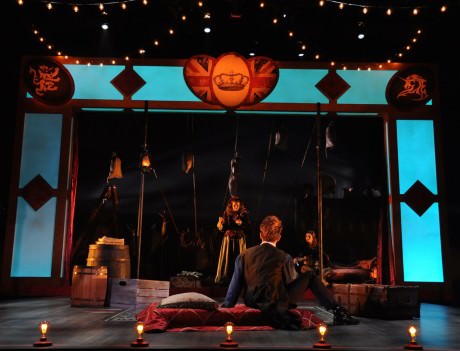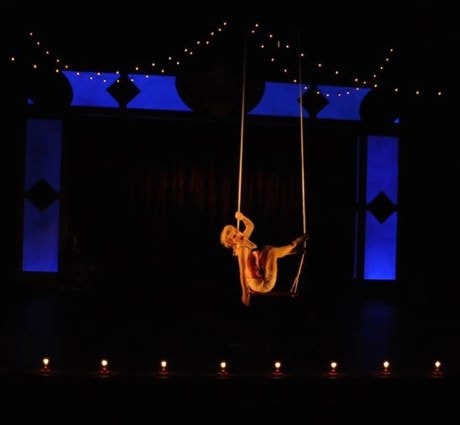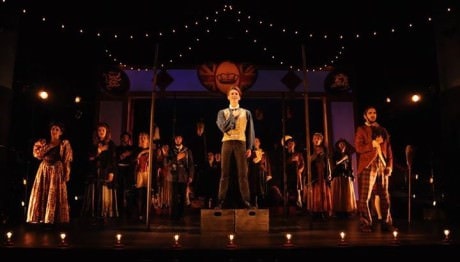American University’s new production of The Threepenny Opera is a stunning re-imagining of Bertolt Brecht’s classic work of “epic theatre.” Director Cara Gabriel, Scenic and Lighting Designer Jason Arnold, and Costume Designer Barbara Tucker Parker together create a visual feast that is as imaginative and garishly gorgeous as anything I have seen in DC on either the university or professional levels. The design elements and bodies on stage are so well-integrated into Brecht’s text and Kurt Weill’s music that literally every scene is a photo-ready tableau that ultimately proves why theatre is better than anything else at making the hallucinogenic manifest in front of our eyes.

Singer (Ariana Kruszewski). Photo by Jason Arnold.
Long before Sweeney Todd or Moulin Rouge, it was The Threepenny Opera that dramatized the violent, sexually opulent underbelly of Victorian Europe. And although Gabriel often strikes a purist note in her staging – exposed ropes and pulleys, visible actors lounging in the wings, the absence of a fourth wall – it is also positioned as a critique of Brecht himself, of his own moral failings and those of the era he lived in. In her director’s note, Gabriel offers a historically belated commendation to the many mistresses of Brecht who served as his frequent literary and theatrical collaborators, the extent of which is not known. This recognition of the sexism inherent even in the so-called revolutionary ethos of Industrial Modernism calls into question Brecht’s own privileged status as a God of Modern Theatre, and presents the numerous female characters in Threepenny – all of them written to be sexualized, objectified, demonized or some combination of the three – in a striking new light. In the season of the DC-wide Women’s Voices Theatre Festival, American’s production manages to find a backdoor into significant gender critique. And, most important, it does all this heavy lifting with a smile on its face and a song in its heart.
And what a song it is. Kurt Weill’s music, which sounds a bit like a manic depressive music box dancer who’s gone off her meds, is difficult to say the least. Even the songs that have become standards like “The Ballad of Mack the Knife” and “Pirate Jenny” have enough syncopations and about faces to put Sondheim to shame. But Music Director Brandon Adams massages the songs well enough to make them relatable while still maintaining that Cockney trashy charm that makes them so lovable in the first place. The ensemble of beggars, whores, and other undesirables mostly nails the music, especially in group numbers like “Cannon Song” and the three “Threepenny Finales.”

Choreography by Ralph Glenmore hits the stylistic sweet spot the cast is aiming for, halfway between workman like socialist movement and dirty-elegant Victorian waltz. Vignettes in between each scene utilize the ensemble in all sorts of sideshow diversions, from hula hoops and juggling to clowning and acrobatics. Indeed, American University has out-epic’d Brecht in its combination of indulgence in and commentary on the 19th century “beggar’s theatre” that has gone on to inspire everything from Sweeney Todd to American Horror Story. The vaudeville trashy-glam aesthetic is evidenced in the blood-red velvet curtain that hangs under an ornate mock-proscenium frame affixed on the actual raked stage, itself replete with incandescent foot lights. It is a twisted carnival that looks alluring enough until the knives come out, and even then there’s something about the danger that is, well… sexy.
Indeed, this is a physical show in the broadest sense of the term. The plot itself revolves around the aforementioned Mack the Knife (Jordan Halsey), a sort of king of the beggars whose marriage to the superficially upstanding Polly (Stephanie Wilson) rankles her mother and father, the miserly Mr. and Mrs. J.J. Peachum (the seamy, sadistic Patrick A. Kavanagh and Gianna Rapp, respectively). Halsey is a revelation as Mack, all dark eye makeup and loose sensuality. His superficially languid demeanor masks a burning intensity that comes alive at key moments to startle and admonish the audience in equal measure. Stephanie Wilson is hilarious as Polly, crying exaggerated tears cried exaggerated tears for her “Mackie” before turning around, hiking up her knickers, and doing a rousing edition of the famous “Pirate Jenny.”
Jenny herself (Jana Bernard), Mack’s trusty whore who eventually betrays him, is a consummate performer who really nails the circus elements of the show, particularly during the “Solomon Song” where she does all sort of acrobatic tricks on a swing dropped from the ceiling. As though Polly and Jenny weren’t enough, Mack has also to contend with Lucy Brown (Anne Norland) his first wife who helps him break out of jail under the eye of Tiger Brown (Anthony Nimmo), the constable who seems to have a close, very close, friendship with Mack. Norland has a great scene stealing moment during her first song, “Barbara Song” which doesn’t even appear until the Second Act.

It is difficult to judge which of the characters in Threepenny is the most morally bankrupt. Is it Mr and Mrs. Peachum who extort, of all people, the beggars themselves for a portion of their takings? This seems bad before one remembers the thieves, the whores, and Mack himself, who is on the run first for marrying Polly and then for all his other crimes. But perhaps it is the unseen character of Queen Victoria and the Law she represents who is truly the most morally bankrupt for it is she that delivers the infamous deus ex machina that saves Mack in the end. American’s production adds a twist to the classic ending that left the audience paralyzed in disbelief.
Brecht’s famously didactic text is strangely mute in this production, overwhelmed by the sheer lawlessness of it all. From the top down the only laws are greed and lust, and any pretense of law or moral custom is no more genuine than the threepenny vaudeville-style set. Perhaps indeed it is this very anarchy that gives credence to Brecht’s well known belief in complete socialist revolution.
Alas, in American’s production even the possibility of salvation by total annihilation seems distant. And yet despite this darkness there is much joy, ease, and lightness to Gabriel’s Threepenny. The design is bright and polished, the choreography swift and the voices raised high in song. The whole world may be on fire, this show seems to say, but they’ll be damned if they won’t play a collective fiddle while the inferno blazes on.
https://youtu.be/NjtiQITDLws
Running Time: Two hours, with one 15-minute intermission.
The Threepenny Opera plays through Saturday, October 24, 2015 at American University’s Greenberg Theatre – 4200 Wisconsin Avenue NW, in Washington, DC. For tickets, call the Box Office at (202) 885-2587 or purchase them online.




